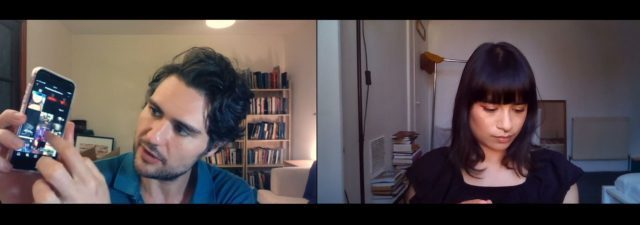
Javaad Alipoor and Peyvand Sadeghian guide viewers through multimedia, immersive Rich Kids: A History of Shopping Malls in Tehran
RICH KIDS: A HISTORY OF SHOPPING MALLS IN TEHRAN
Woolly Mammoth Theatre Company
April 1-18, $15.99
www.woollymammoth.net
javaadalipoor.co.uk
The Javaad Alipoor Company’s Rich Kids: A History of Shopping Malls in Tehran is a virtual production of, by, and for its time like no other. Previously presented at the Public Theater’s Under the Radar festival in January, the immersive online experience, now livestreaming from DC’s Woolly Mammoth Theatre Company through April 18, takes on capitalism, consumerism, climate change, government corruption, income inequality, colonialism, the collapse of civilization, geopolitics, and just about everything else under the sun as it relates to the past and future of the Anthropocene Epoch, all stemming from a fatal car accident in Iran in 2015.
On May 1 of that year, the New York Times reported that twenty-year-old Parivash Akbarzadeh and twenty-one-year-old Mohammad Hossein Rabbani-Shirazi were killed when his brand-new yellow Porsche, which she was driving, crashed after reaching speeds of more than 120 miles per hour. The focus of the story, however, went beyond the tragedy and instead zeroed in on the public reaction in the aftermath, particularly how people took to social media to lambast Parivash and Hossein, the latter described by the Times as “the nouveau riche grandson of an ayatollah,” for their carefree, luxurious lifestyle, which they and those like them show off on Instagram, flaunting the country’s rigid Islamic laws.
The follow-up to 2017’s multimedia The Believers Are But Brothers, about the birth of Islamic radicalization over the internet and WhatsApp, Rich Kids was previously staged at the Edinburgh Festival and various venues in England but has been reimagined for online viewing. Written by Alipoor, created by Alipoor and Kirsty Housley, and performed by Alipoor and Peyvand Sadeghian, the seventy-minute show goes backward in time from the crash itself to the specific events leading up to it as well as to the decades and centuries before that impacted the development of current Iranian culture, including the role of American politics and capitalism. The narrative toggles between Instagram Live, where text and photos tell the story of Parivash and Hossein with hashtags to such other pages as #richkidsoftehran and #mallwave and the internet, where Alipoor and Sadeghian go on a deep dive into the anthropological annals of the world using animation, archival footage, European and traditional Safavid painting, and video of a burning planet bathed in dripping red. “History isn’t linear,” they point out. “No past. No future. There’s no reason why time as we feel it should be a physical thing.”
In its nine-part manifesto, the Javaad Alipoor Company declares, “Every work we make should say something directly about politics,” “Every project needs to speak to history, and find something new about how we got here,” and “Things have to be fun,” among other statements of purpose. Rich Kids accomplishes that and more, although it can at times be bumpy as you switch screens and technological elements overlap. Along the way it makes hard-hitting observations about who and where we are in the twenty-first century, not just Iranians or the wealthy children of the elite filled with contempt but every one of us. “We’re not the first people to feel like our world is ending,” they explain. “We spend a lot of time thinking about how the world will end, but we almost never think to ask those whose worlds have already ended.” They also make note of how “we now upload more pictures to Instagram every day than existed in total a hundred years ago.”
The play is perhaps best summed up by an image of a huge fireball exploding as Alipoor and Sadeghian wonder “why we find it easier to imagine the end of the world than the end of humanity.” To keep the investigation going, performances on Friday will be followed by community conversations with such facilitators as Héctor Flores Komatsu, Adam A. Elsayigh, and Trà Nguyễn, while Sunday shows will conclude with talkbacks featuring Alipoor and journalists and cartoonists, moderated by Cynthia Schneider.